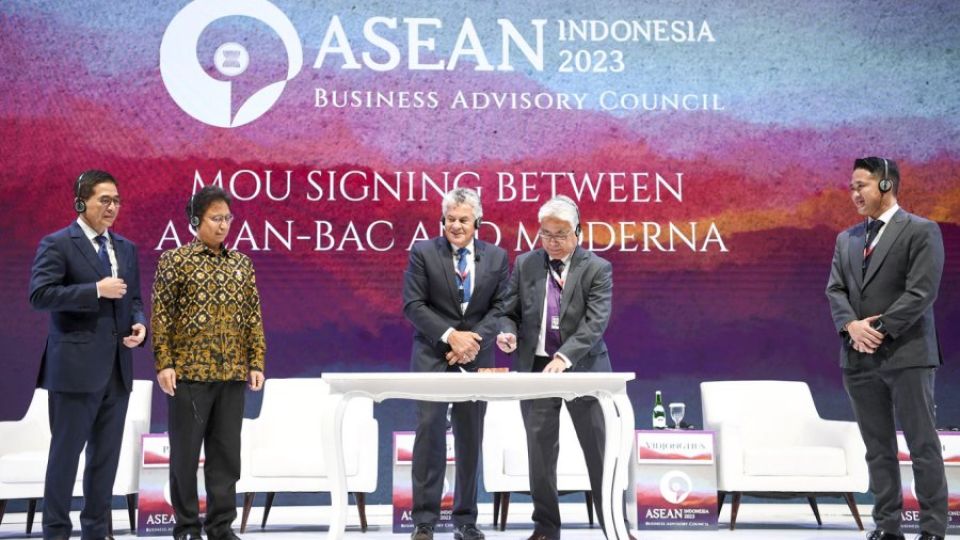September 11, 2023
JAKARTA – Indonesia concluded the 43rd ASEAN Summit in Jakarta on Thursday with a ceremonial handover of the bloc’s chairmanship to Laos, marking nine months of mixed success in shepherding the 10-nation bloc to address pressing internal and external issues.
Among ASEAN’s most intractable problems are the continuing military crisis in Myanmar, which has eaten away at perceptions of the group’s integrity over the past two years, and the regional fallout of the geopolitical rivalry between the United States and China.
Under its chairmanship theme “ASEAN Matters: Epicentrum of Growth”, Indonesia prioritized questions of economic development, including during the high-level meetings this week.
A total of 24 documents were published throughout the week, consisting mostly of joint statements and overviews of economic cooperation efforts and goals for the rest of the year. Indonesia has three months of de facto ASEAN leadership left.
At the launch of the ASEAN Indo-Pacific Forum (AIPF) this week, President Joko “Jokowi” welcomed 93 fresh projects valued at around US$38.2 billion and heralded new ASEAN frameworks on the blue economy, digital economy and electric vehicle industry.
Read also: ASEAN pitches itself as open for business with any country
The strong emphasis on the economy, however, has drawn a mixture of praise and criticism, with observers commending the development efforts but accusing Indonesia of neglecting the wider geopolitical prerequisites for economic security.
“Being the epicentrum of growth very much depends on a much larger global context,” said Yose Rizal Damuri, executive director of the Centre for Strategic and International Studies (CSIS), a Jakarta think tank, at a panel on Thursday.
“All over the world we’re witnessing the malfunction of global economic machinery, [including] in the US, European Union and China,” he added.
Missed opportunity
The Indo-Pacific region, where ASEAN is attempting to assert its centrality, has been under pressure from the Washington-Beijing rivalry.
China’s aggressive foreign policy in parts of Southeast Asia, particularly its claims to the strategic South China Sea and assertions of sovereignty over regions that the international community recognizes as belonging to other countries, has caused consternation among ASEAN member states.
Read also: ASEAN falls silent on South China Sea
But Jokowi has sought to skirt these divisive issues, maintaining that the economy has to remain ASEAN’s utmost priority.
In response to a question on the last day of the Jakarta summit about whether this economic focus was advisable given the current geopolitical situation, Jokowi asserted that it was “very much” the region’s best course of action.
“It’s the correct thing to do because the world needs an axis to tilt on its right course amid the rivalries and geopolitical tensions,” the President said. “ASEAN has big potential, given our above-average [economic] growth, demographic bonus and political stability.”
But this single-minded focus may have come at a cost.
ASEAN was unwilling to condemn China despite its acts of aggression, illegal claims and intimidation, noted international relations expert Dewi Fortuna Anwar of the National Research and Innovation Agency (BRIN).
Despite pressure for a joint statement denouncing Beijing’s encroachments, ASEAN has seemingly skirted any explicit mention of the issue, favoring a few general calls to respect international law.
“ASEAN should have called a spade a spade. China would have respected ASEAN more if it dared to openly object to its policies,” Dewi told The Jakarta Post on Friday. “After all, China needs Southeast Asia as much as it needs China.”
China has been ASEAN’s most prominent trading partner since 2009, with a trade balance totaling $975.3 billion in 2022.
Read also: Jokowi says China sees ASEAN as central to peace in Indo-Pacific
Promising signs
Yet observers welcomed some indications of progress on the Myanmar crisis, a predicament that has sparked criticism of ASEAN for perceived weakness and ineffectiveness.
The bloc has struggled to implement its Five-Point Consensus (5PC) for peace in Myanmar since the military coup d’état two years ago. The situation has been exacerbated by differences among ASEAN member states, with reports of some countries defending the Myanmar junta and engaging with the military government outside of the regional grouping.
Nonetheless, on Tuesday, ASEAN leaders announced they would bar Myanmar from the bloc’s 2026 chairmanship. They also agreed to form a troika among past, current and upcoming chairs to engage with Myanmar’s stakeholders with more consistency.
Read also: Philippines steps in as ASEAN 2026 chair after troubled Myanmar opts out
Lina Alexandra, head of the international relations department at CSIS, said the show of internal solidarity against the Myanmar junta was praiseworthy.
Dewi of BRIN noted there was no mechanism to kick Myanmar out of ASEAN.
“But they have successfully reached a consensus to penalize Naypyidaw,” she said. “It’s an important development.”


